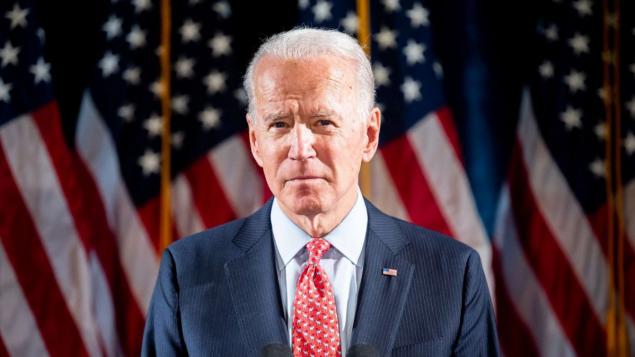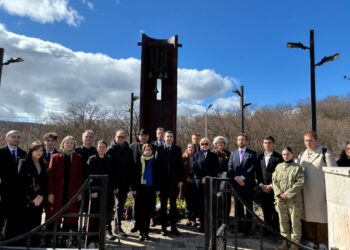Georgian politicians, political scientists, representatives of non-governmental organizations and the art sphere are appealing to US President Joe Biden for help.
The letter, entitled ‘Freedom Memorandum’, reads:
“We, the undersigned Georgian professionals from different backgrounds, stand united in requesting your support for our nonviolent struggle for freedom and the democratic future of Georgia. As the White House prepares to host the 2021 Summit of Democracies, the liberty and democracy that the United States has eagerly helped build and sustain in Georgia are hanging in the balance. We, the Georgian people, join other freedom-loving nations against the hybrid offensive of autocratic regimes.
“Regrettably, the Georgian ruling party employs all means and methods necessary to prolong its grip on power, with no regard to democratic institutions, checks, and balances, the essential bilateral relationship with the United States, or the will of the Georgian people. As freedom-loving people of Georgia, it is our responsibility to drive positive change. Yet, we fight this battle on an uneven field because the regime has vast resources at its disposal. More than ever before, unwavering political support from the United States is vital.
“THREATS WE FACE: In 2012, the peaceful transfer of power in Georgia paved the way to consolidating the country’s democratic credentials – fulfilling the promise of the 2003 Rose Revolution. Almost a decade later, however, this promise has been broken, and a once-in-a-generation opportunity has been squandered. One-party rule under the “Georgian Dream” (GD) administration, informally controlled by oligarch Bidzina Ivanishvili, has undermined the legitimacy of the political process and marginalized civil society, political opposition, and independent media.
“The weak rule of law and severe concerns about the politicization of the judiciary have eroded the investment environment. American companies have been pushed out of strategic projects, including the $2.5 billion Anaklia deep seaport. Transparency International has described the situation in Georgia as “state capture” by GD and Ivanishvili, while the country has regressed on The Economist’s Democracy Index.
“In recent elections, in particular, since 2018, the ruling party has clung to power through widespread vote-buying, intimidation, and misuse of administrative resources. During pre-electoral periods, GD has inappropriately politicized and exploited state institutions, including the security forces, police, prosecutor’s office, and education system. The Georgian government has even employed so-called “Troll Farms,” akin to those used by the Kremlin, to manipulate public opinion, spread disinformation, and discredit political opponents, journalists, and civil society. The OSCE multinational observation missions have concluded that the most recent elections (2020 parliamentary and 2021 municipal) were “competitive, but not free or fair.”
“The most recent manifestation of Georgia’s democratic backsliding is handling the case of ex-President Mikheil Saakashvili. U.S. Senators Shaheen, Johnson, Risch, and Cardin recently issued a joint statement expressing concern over Saakashvili’s confinement and deteriorating health. Amnesty International has characterized Saakashvili’s imprisonment and humiliating treatment as “political revenge.” European Parliament members have already proposed sanctions against key human rights violators “who enabled the inhuman and degrading treatment” of Mikheil Saakashvili.
GEORGIA FORWARD VISION:
“Following the Rose Revolution, Georgia has emerged as a strategic ally of the U.S. and a beacon of hope and liberty in a region full of authoritarian forces. With the decisive engagement of civil society, Georgia transformed from the brink of state failure to a vibrant young democracy and a net contributor to international security – in Iraq, Afghanistan, and elsewhere.
“Nevertheless, the reality of territorial occupation by Russia, hybrid challenges to statehood, weak institutional governance experience, and the corroding effect of oligarchy have hamstrung our ability to do better.
“Georgia’s democratic forces have expanded, gained experience, and grown diverse. We can achieve more, but we can no longer do it alone in a region dominated by authoritarian powers. We may diverge in policy choices, yet we share a forward vision of a free, prosperous, and secure Georgia – a dependable ally of the United States, NATO, and the European Union.
OPTIONS TO MAKE A DIFFERENCE:
“We are confident that the steps outlined below will promote American interests and transatlantic principles by strengthening Georgia as a frontline country in the fight for liberty as part of the U.S.-led global community of democracies.
“Demand Results, Empower Civil Society: Communicate in no uncertain terms to Georgian authorities that the state capture, democratic backsliding, and toxic polarization will not stand. Encourage a political reset, best manifested in early parliamentary elections in 2022. The aim must be holding the last snap election of its kind. The proposed special election should be administered under a new, nonpartisan Central Election Commission to eradicate the perception that the ruling party controls the Georgian CEC. To ensure legitimacy and clarity of results, the campaign and election must take place under improved, more transparent, and fairer rules. We also request expanded international observation missions, such as OSCE/ODIHR and U.S. State Department observers throughout the country.
“A clear starting point for the White House could be giving Georgian civil society leaders a voice at the upcoming Summit of Democracies.
“Reassess Development Aid, Introduce Strict Conditionality: Stand firm behind the efforts to ensure the political neutrality of the Georgian armed forces. Condition financial support for the police and security apparatus on their tangible disentanglement from the ruling party machinery. Conduct a comprehensive political context assessment with Georgia’s civil society development partners to adapt U.S. aid to current challenges. Shift the weight of USAID programs toward independent institutions and vetted civil society partners. Attach explicit conditionality to the justice system until speedy and tangible steps are taken to meet earlier commitments, particularly in the appointment of the High Council of Justice and Supreme Court judges.
“Hold Accountable the Sources of Kleptocracy: Invoke the Global Magnitsky Act against key personalities in Georgia’s ruling party and judiciary, who have eroded the rule of law, weaponized the courts and the security apparatus against political opponents, and most recently, violated the fundamental rights of Mikheil Saakashvili. With that in mind, insist on the fair trial and humane treatment of Saakashvili under all possible legal frameworks.
“We stand ready to engage with you substantially, coordinate joint action, and drive change that will make Georgia a success story as a U.S. ally in the critical region of the world.”
The appeal is signed by:
Temur Iakobashvili – Former Ambassador of Georgia to the United States;
Batu Kutelia – Former Ambassador of Georgia to the United States;
Vasil Sikharulidze – Former Ambassador of Georgia to the United States;
Giorgi Badridze – Georgian Foundation for International and Strategic Studies;
Gigi Gigiadze – Economic Policy Research Center;
Shota Gvineria – Economic Policy Research Center;
Alexander Petriashvili – Georgian Foundation for International and Strategic Studies;
Zaza Abashidze – Editor-in-Chief of Real Politic;
Zviad Adzinbaia – International Security and Digital Diplomacy Officer;
Tinatin Akhvlediani – Researcher;
Eka Akobia – Professor at Caucasus University and Tbilisi State University;
Fadi Asli – President of the International Chamber of Commerce;
Liza Batiashvili – Musician;
Sopho Batilashvili – Singer;
Giorgi Bedineishvili – Free University Business School;
Anastasia Bendukidze – Knowledge Foundation;
Marina Beridze – Music Producer;
Ilia Beroshvili – Actor;
Zaza Bibilashvili – Chavchavadze Center;
Tina Bokuchava – National Movement;
Lasha Bugadze – Writer;
Anna / Anuna Bukia – Director;
Paata Burchuladze – Opera Singer;
Levan Butkhuzi – Biologist;
Sergo Chikhladze – Health Expert;
Eter Chkadua – Georgian-American artist;
Gocha Chkadua – Georgian-American artist;
Tamta Chkhikvadze – Physicist;
Eka Demetradze – Actress;
Jaba Devdarini – International Consultant on Public Administration Reform;
Ketevan Devdariani – Screenwriter;
Lasha Dzebisashvili – Professor of Political Science and International Relations;
Mari Eliadze – Margaret Thatcher Center;
Giorgi Gabunia – Journalist;
Paata Gaprindashvili – Georgian Reform Association;
Nana Gegechkori – Doctor;
Badri Gelitashvili – Lecturer at the Free University;
Beka Gochiashvili – Pianist;
Tornike Gordadze – Professor at the French Institute;
Inga Grigolia – Journalist / TV Presenter;
Achiko Guledani – Musician;
Zurab Gumbaridze – General Director of Formula TV;
Ekaterine Gureshidze – International Financial Corporation;
Zurab Guruli – Doctor working in America;
Nika Gvaramia – General Director of the Main Channel;
Zurab Japaridze – Girchi – Founder of More Freedom;
Gia Japaridze – University of Georgia;
Mamuka Japaridze – Artist;
Teona Jorbenadze – Screenwriter/Producer;
Giorgi Kadagidze – Former President of the National Bank of Georgia;
Sandro Kakulia – Presenter;
Sergi Kapanadze – Georgian Reform Association;
Nodar Kharshiladze – Center for Strategic Analysis of Georgia;
Mamuka Khazaradze – Founder of Lelo Georgia;
Mariam Khokhobaia – Margaret Thatcher Center;
Elene Khoshtaria – Founder of the Movement Droa;
Ana Khurtsidze – University of Georgia;
Irakli Khvadagiani – Historian;
Dodona Kiziria – Professor at Indiana University;
David Kldiashvili – Presenter;
Vera Kobalia – World Economic Forum;
Guri Koiava – Entrepreneur;
Zaza Korinteli – Musician;
Nino Kupreishvili – Artist;
Eka Kvesitadze – Journalist;
Nene Kvinikadze – Writer;
Khatuna Lagazidze – Center for Civic Initiatives and Innovations, Political Scientist;
Niko Lomashvili – Artist;
Nino Macharashvili – Forset;
Vaja Mania – Jazz Singer;
Tornike Margvelashvili – Musician;
Eduard Marikashvili – Democratic Initiative of Georgia;
Giorgi Meladze – Professor of Ilia State University;
Nika Melia – Chairman of the National Movement;
Toresa Mossy – Writer;
Shame Movement;
Khatuna Mshvidobadze – Professor at George Washington University;
Giorgi Mshvenieradze – Free University, Lawyer;
Papuna Sharikadze – Pianist;
Elene Saakashvili – Atlas Network;
Bakur Sulakauri – Publisher;
Giorgi Targamadze – Journalist / Deputy General Director of Formula;
Ana Tavadze – Forbes Georgia;
Zurab Chiaberashvili – Former Minister of Health;
Gia Nodia – Caucasus Institute for Peace, Democracy and Development;
Giorgi Piradashvili – Businessman;
Mirian Popkhadze – Foreign Policy Research Institute;
Irakli Porchkhidze – Georgian Institute for Strategic Studies;
Maia Otarashvili – Foreign Policy Research Institute;
Anita Rachvelishvili – Musician;
Tato Russia – Musician;
Natia Samushia – Free University;
Sophie Chkonia – Founder of Mercedes-Benz Fashion Week;
Eka Tkeshelashvili – Foreign Policy Research Institute;
Konstantine Topuria – University of Georgia;
Vato Tsereteli – General Director of TV Pirveli;
Niko Tsetskhladze – Artist;
Gvantsa Tsulukidze – Georgian Institute of Democracy;
Irakli Vacharadze – Activist;
Nanuka Zhorzholiani – Journalist / TV presenter;
Lasha Bregvadze – Expert in Security Issues;
Gela Vasadze – Center for Strategic Analysis of Georgia.













